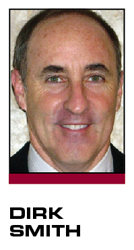“That’s a dream job.”
That was the reaction I usually encountered when I told someone I was a travel director for a Major League Baseball team. When I described the job, people would gloss over the details and just focus on the glamour.
“And you get paid to do that?”
I was required to be on the road for seven weeks during spring training and then roughly 100 days cumulative from April to September.
“Wow, you get to travel with the team!?”
If we had a night game, I’d likely be at the ballpark from 9 a.m. until 11 p.m.
“You get to see all the games, too!?”
The job was much like being an umpire: No one noticed you unless something went wrong. Imagine losing a brutal extra-inning game, traveling across the country all night, and having our chartered plane arrive but the charter buses are nowhere in sight. All of the players are glaring at you with the you’d-better-do-something look in their eyes.
“You get to know the players!?”
Working directly for a sports team shouldn’t necessarily be the holy grail of the industry — not when so many sports-oriented opportunities and vocations pay more with less stress, and without the shadow of people who would happily take your job for less money, perhaps (laughingly) even for free. Why do so many people aspire to the apparent sexiness of working directly for a sports team and only find themselves languishing in a sea of résumé-sending dead-ends, when instead they could use their latent talents to carve successful sports-oriented careers?
I left the team and used my travel experience to form a meeting planning company focusing on sports businesses (e.g., manufacturers, suppliers, apparel). I sit on the periphery of sports and enjoy the view, and there are hundreds of comparable vocations. Similar to the rest of corporate America, many positions in sports business are outsourced and can run the gamut from clubhouse food catering to legal advice; physical rehabilitation to psychological assistance; team doctor, dentist, nutritionist, or massage therapist.
Pick a profession, and there’s a good chance it can provide a service to a sports team specifically or to the industry in general. Consultants have done this for years.
Do you have an entrepreneurial spirit? Are you capable of thinking outside the box?
Sports are no different than any other business. Build a better mousetrap, and suddenly you’re in the industry. Author Bill James created an innovative sports statistical analysis called sabermetrics and parlayed that into a series of admired sports books, which now are a part of the upcoming film “Moneyball,” starring Brad Pitt.
Sports-affiliated vocations are ubiquitous and can be crafted from myriad niches: a hotel sales manager with a focus on sports teams; an event planner specializing in product launches; a corporate head hunter placing positions solely within the sports industry; marketing and sponsorship specialization. Heck, some company has to print the team’s publications, right? The list is virtually endless.
I won’t deny that my baseball career opened many contact doors, but my sports industry “network” expanded primarily as a result of my meeting planning. Similarly, securing a sports team client immediately elevates the perspective other potential customers may have, as well as referral possibilities.
If indeed your goal is still to work for (rather than with) a sports team, I advocate attempting one of the aforementioned ancillary methods. You can build experience and credibility while prying open the vaulted sports doors through the contacts and the relationships you establish — and, ironically, you may be surprised by the satisfaction you obtain just being where you are.
Finally, under the category of “be careful what you wish for,” working for a sports team immediately places a skewed focus on what would otherwise be considered mundane news. I contracted adult chicken pox while employed with the San Francisco Giants, and my daily proximity to the players ratcheted up the concern level. I was suddenly (and embarrassingly) Centers for Disease Control fodder for the USA Today.
“You got your name in the paper?”
Dirk Smith (dsmith@sdninc.com) is president of Sports Destination Network Inc.




